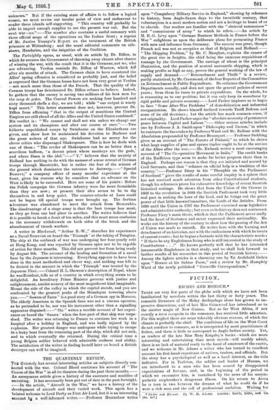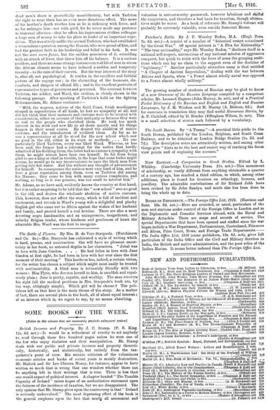FICTION.
RICHES AND HONOUR.*
THERE are very few parts of the globe with which we have not been familiarized by novelists within the last thirty or forty years. Tho romantic literature of the Malay Archipelago alone has grown to im- pressive dimensions, and of late Miss Grimwood has introduced us to the sinister magic of New Guinea. But so far West Africa, if not exactly a terra incognita to the romancer, has received little attention. For this neglect there are some tolerably obvious reasons, of which the climate is probably the chief. The conditions of life on the West Coast do not conduce to romance, as it is interpreted by most practitioners of fiction, and there is little to correspond to Anglo-Indian society. Yet, as readers of the late Miss Mary Kingsley's books—which are more interesting and entertaining than most novels—will readily admit, there is no lack of material ready to the hand of amateurs of the exotic, and we welcome in Mr. Adams a writer who has turned to excellent account his first-hand experience of natives, traders, and officials. But the story has a psychological as well as a local interest, as the title indicates. For in Tarleton, the soldier and leader of Houses, wo are introduced to a man who has been soured by disappointed expectations of fortune, and, in the beginning of the period in which we encounter him, is tantalized by the news of his unsym. pathetic stepbrother's dangerous illness. On his return to Accra he is torn in two between the dreams of what he could do if he were a rich man and the call of professional ambition. Waiting for • Ridge+ and I10:10.If. 13 W. H. Adams. London: Smith, Eider, and Co. Its. mt.] dead men's shoes is proverbially unsatisfactory, but with Tarloton the right to wear them has an even more disastrous effect. The news of his brother's death reaches him as he is sickening with fever, and so far unhinges him—not with grief, for he never made any pretence to fraternal affection—that he offers his impecunious civilian colleague a largo sum of money to take his place as leader of an important expe- dition. This was utterly unlike the normal Tarleton, who had established a tremendous reputation among the Hausas, who were proud of him, and had the greatest faith in his leadership and belief in his luck. It was not the auri sacra fames, but the sudden possession of it, coinciding with an attack of fever, that threw him off his balance. It is a curious problem, and there are sonic strange instances in real life of men in whom tho African climate seems to have induced a sudden and temporary insanity—to the ruin of their careers. But the true interest of the story is, after all, not psychological. It resides in the excellent and faithful picture of the voyage out ; in the chronicling of the humours, dis- comforts, and dangers of official life ; and in the excellent portraits of representative types of governors and governed. The contrast between Tarloton, the soldier, and Ward, the civilian, is clearly shown in the following passage. After speaking of Tarleton's hold on the fighting Mohammedans, Mr. Adams continues :-
"With the negroes, natives of the Gold Coast, fetish worshippers steeped in superstitions of all kinds, he had no sympathy at all, and did not think that their manners and customs were to be treated with consideration, either on account of their antiquity or because they were so real to the people who cherished them. He took too much interest in his work and new life to sit down quietly and let things happen in their usual course. He desired the abolition of native customs, and the introduction of civilized ideas. As far as he was a representative at all he stood for the new school which saw no good in the old, either in its ways or methods. . . . No one particularly liked Tarleton, every one liked Ward. Whereas, as has been said, the former had a contempt for the native that hardly. admitted of his disliking them, the latter had so curious a sympathy with them, ho might almost have been one himself.. So far from being glad to see a king or chief in trouble, in the hope that some kudos might accrue, ho would go to any inconvenience to save the black man from getting into hot water. And this without any thought of advancement for himself. In consequence the natives were very fond of him, and he bore a groat reputation among them, even as Tarleton did among his Hausas ; they came to him with many curious complaints, and nothing, so long as it was genuine, was too small to interest him."
Mr. Adams, as we have said, evidently knows the country at first hand, but it is rather surprising to be told that the " new school " sees no good in the old, and desires the wholesale abolition of native customs., This, however, does not affect the story, which is full of incident and excitement, and reveals in Ward's young wife a delightful and plucky English girl who came out to Africa against the wishes of her husband . and family, and proved herself a real heroine. There are also a most diverting negro handmaiden and an unimpressive, insignificant, and unlucky Belgian trader, whose kindness and gentleness of heart the admirable Mrs. Ward was the first to recognize.































 Previous page
Previous page